Driving along Georgia Highway 60 near Woody Gap School, you see a Georgia Historical Marker announcing “Homesite of Joseph Emerson Brown.” Stopping to read it, you find that Joseph Emerson Brown, four-time governor of Georgia, lived with his parents at about the same location where the school is today.
We like to take pride in claiming that famous people lived here—or, for that matter, “slept here.” Once a citizen of Union County, Brown sat in the state’s highest seat from 1857 through 1865 when Georgia’s capitol was located at Milledgeville, Georgia. He served as governor during the turbulent years of secession and the Civil War.
What can we learn about this tall, lanky man whose pictures remind us somewhat of Abraham Lincoln, except that Brown’s beard was white?
He was not born in Union County, Georgia. Instead, his birth state was South Carolina, in the Pickens District, where he was born April 15, 1821. His parents were Mackey and Sally Brown. As with most who left one area and went to another in those years, the Browns moved to what we know as Suches, Georgia and settled at Woody Gap. There the family farmed. Few educational opportunities existed there for the young Brown beyond the one-teacher school that was held for a few months a year. We can imagine, with his bent for learning, he longed to have a better education.
That opportunity came when Joseph Emerson Brown was nineteen. In 1840, his father gave him two oxen that evidently had been yoked together and trained for work on the farm. Brown took the oxen and his meager belongings and left, dressed in a suit his mother made for him from wool from the Brown’s own sheep. He made his way over the mountains to South Carolina where he sold the oxen to gain money for room and board. He entered Camden Academy. The administrator must have seen promise in the young Brown, for he went to school there on credit, promising to repay the loan after graduation.
When he finished at Camden, he must have returned to visit with his parents at Suches. But soon he made his way to Canton, Georgia where he got a job teaching school. In whatever time he could spare, he studied law (it was called “reading law” then). He passed the Georgia bar examination in 1845.
Then came the next lap in his educational journey. He went to Yale University School of Law, graduating in 1846 with a Bachelor of Law degree. He had borrowed money to attend Yale from a friend and physician in Canton whom Brown would later appoint to the Georgia-owned railroad, the Western and Atlantic.
He opened his law practice in Canton and soon began earning a sizeable annual salary for 1846—up to $3,000 per year. He also served as a tutor to certain young men whom he encouraged. A shrewd businessman as well as a lawyer, he was able to make investments that later would make him one of the wealthiest men in Georgia.
His courtship with Elizabeth Grisham began. She was a daughter of a Baptist minister. They were married in 1847. To them were born eight children: Julius, Mary, Joseph, Franklin, Elijah, Charles, Sally and George. Their son, Joseph Mackey Brown, would later follow in his father’s footsteps and serve as Governor of Georgia (1909-1911 and 1912-1913).
Joseph Emerson Brown’s political career began actively when he was elected to the Georgia senate from his district in 1849. In the 1852 national election, he was the presidential elector on the Democratic ticket of Pierce and King. He was appointed as judge of the Blue Ridge Judicial Circuit in 1855.
His next big political move came when he was elected governor of Georgia in 1857. His opponents among the landed large plantation owners called him “The Ploughboy.” They sought to discredit him because he had grown up on a poor mountain farm in North Georgia. The man who had taken his education and career into his own hands was not to be dismissed with such an epithet. His political leanings up until 1865 were more like those of President Andrew Jackson. In fact, he was labeled by historians as a “Jacksonian Democrat.” He held firmly to states’ rights. He appealed to and upheld the common man. As Georgia’s 27th governor, and elected for four terms (1857, 1859, 1861, and 1863), he served during one of Georgia’s most turbulent periods.
Vital to the economy prior to the Civil War and essential to the war effort during the conflict, the railroad was one of Governor Brown’s chief projects. He replaced top management positions in the Western & Atlantic Railroad as well as minor officials. Many who received railroad jobs were his staunch supporters. He advised the superintendent to “cut all unnecessary expenses, but to keep the railroad in good repair.” He also wanted unnecessary employees dismissed and to pay salaries commensurate to those paid by other railroads. Intoxicating beverages were not allowed. Strict obedience to the rules concerning operation of the railroad was to be followed. The rules were printed, posted and also delivered to all employees.
Next: More on Governor Brown and on his post-war political career.
c2004 by Ethelene Dyer Jones; published March 11, 2004 in The Union Sentinel, Blairsville, GA. Reprinted by permission. All rights reserved.
c2004 by Ethelene Dyer Jones; published March 11, 2004 in The Union Sentinel, Blairsville, GA. Reprinted by permission. All rights reserved.

No comments:
Post a Comment